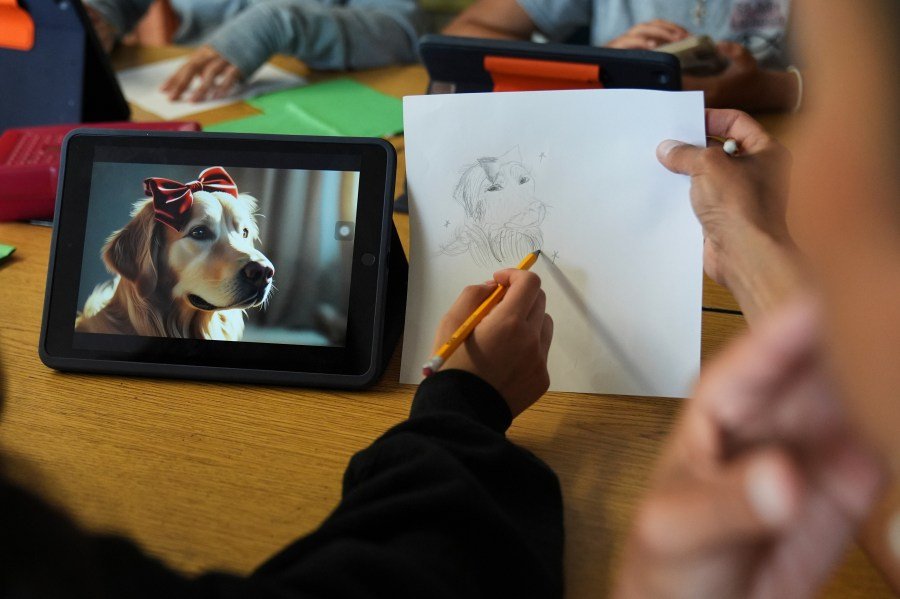
For generations, our education system has been built on a simple formula: Learn the rules, master the mechanics, memorize the facts. Go to school, get the information, then go out and apply it in the real world.
But in the age of artificial intelligence, that formula is not just outdated but dangerous. Because what we’re witnessing is not just a technological revolution but a cognitive regression, and we’re sleepwalking straight into it.
Let’s be blunt. AI now knows more than you do. It knows more than your professors, mentors and bosses. It can write your code, outline your business plan, design your logo, suggest your marketing strategy and do all of it before your morning coffee has cooled.
According to recent internal estimates, up to 25 percent of all code at Google and nearly 30 percent at Microsoft is now written by AI. And that’s not fringe; it’s the new frontier.
But while the machines evolve, we, their creators, are regressing. It’s not because AI is replacing us, but because we are surrendering too willingly, under the pretense of convenience. We are essentially delegating our imagination and creativity to AI.
Ask yourself: When was the last time you read a book, metabolizing its ideas into your own evolving worldview? We now consume without digestion. Our cognitive muscles are atrophying.
Even Ivy League students are reportedly graduating without finishing a single book. They listen to lectures, skim AI-generated summaries and pass the exams. But is that learning? Or is that performance masquerading as mastery?
For centuries, we have poured information into students’ brains, like water in a vase. Now, we are starting to put drops and snippets driven by searches, headlines, biased communities and old beliefs.
Dangerous, isn’t it?
Technology is not taking over; it’s this addiction to convenience that is making us intellectually lazy. We used to believe that AI would automate the mundane: data entry, manufacturing, the repetitive grunt work. But it’s the knowledge workers, those engineers, writers, designers and doctors, who are now being outpaced.
AI is diagnosing diseases faster than physicians, coding faster than developers and even composing music and generating art.
And if we don’t radically rethink how we teach, think and collaborate, we risk raising a generation of humans who know how to ask questions to AI but don’t know how to actually form questions of their own to discover something new. A very productive generation with limited innovation ability.
The scariest part I’ve observed is that we’re actively training AI to be us. We upload our writing style, background and personal preferences into these models so they can respond as if they were us.
But in doing so, we’re creating digital replicas of ourselves. That isn’t collaboration. That, in my opinion, is self-erasure.
The question students ask today — “Why should I do this if ChatGPT can do it better?” — is a fair one. But the fact that we don’t have a good answer to it should terrify us. It means we have failed to define what human intelligence is in the age of artificial intelligence. We have confused comfort with progress and productivity with genuine prosperity.
So what happens if we don’t change? We risk creating a generation that is intellectually passive, emotionally unchallenged and creatively disengaged. We risk building a world of intellectual consumers rather than contributors. A world where AI generates, and humans simply scroll, approve and purchase.
But the bigger issue is that we are not even preparing ourselves to make the change and ask actual questions. Instead, we are arguing on social media and in headlines about AI versus human war.
What we really need now is a new model of collaboration: One where the goal of education isn’t to fill a brain with data but to ignite it. One that respects that we are all different and unique, and the idea of practical for all is obsolete.
Learning must become a dynamic exchange, a friction of ideas. We must bring back real-time debate, disagreement and intellectual discomfort. Only through dialogue, collaboration and perspective-shifting do we discover nuance, unlock creativity and develop true wisdom.
Imagine two individuals unlocking each other’s minds. Interactive discussions create curiosity, thought-provoking conversations, real-world engagement and continuous evolution. And that’s how we become future entrepreneurs, evolve with purpose and lead with action.
If we don’t take this path, then yes, we will become obsolete. Not because AI will defeat us, but because we’ll have surrendered our most human trait: the ability to wonder. And that would be the greatest loss of all.
Sid Mohasseb is an entrepreneur, philosopher, investor, and educator who has spent decades advising businesses, teaching at universities and helping leaders turn ambition into action. He is the founder of the Anabasis Academy.


